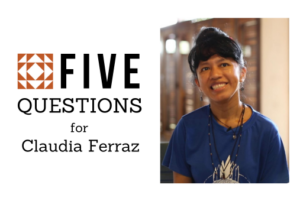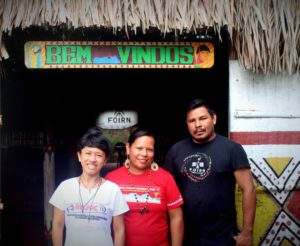For almost six years, Indigenous communicators spread across the upper Rio Negro region, on the border between Brazil, Colombia and Venezuela, have been working together to inform their relatives – a term that, among Indigenous people, does not mean blood kinship, but rather the recognition of a brotherhood beyond the diversity of ethnic groups, cultures and ways of life.
The Wayuri Network of Indigenous Communication of the Amazon emerged in November 2017 to cover the information needs of 23 Indigenous peoples in 750 communities in the region of São Gabriel da Cachoeira, a municipality located in the extreme northwest of Brazil, in the state of Amazonas. The city is known as “the most Indigenous in Brazil,” as 90 percent of its population is Indigenous and, in addition to Portuguese, it has four other official languages: Baniwa, Nheengatu, Tukano and Yanomami, which are just some of the many languages spoken by the inhabitants of the municipality.
In the Wayuri Network, volunteer Indigenous communicators act as correspondents from their communities of origin, and also as hosts and editors for a monthly audio bulletin, the Wayuri Bulletin. The bulletin is distributed via messaging apps, shared between cell phones via bluetooth and broadcast via radiotelephony, in an area where internet access is scarce and unstable. It is also available on online platforms. Due to the linguistic diversity of the region, the bulletin is produced in Portuguese and in the Indigenous languages of its correspondents.

The Wayuri Network's communication work also takes place online through social networks and in person at events and meetings in Indigenous communities, in addition to exchanges with other community communication networks and with Indigenous people from other regions of the country. The network is assisted by the Socio Environmental Institute (ISA, for its acronym in Portuguese) and is part of the Journalism Support Program (PAJOR) of the organization Reporters Without Borders (RSF).
Over the past two years, the work of the Wayuri Network has been internationally recognized on at least two occasions. In June 2020, RSF included the network in a global list of “coronavirus information heroes,” which celebrated the work of 30 media outlets and professionals who “have risen to the challenge” of informing the population about the COVID-19 pandemic. In May 2022, the Wayuri Network received the 2022 Rule of Law award from the World Justice Project (WJP), an organization dedicated to promoting the rule of law around the world. WJP recognized the network “for its extraordinary achievements countering disinformation on COVID-19 and existential environmental threats in the most preserved but increasingly endangered region of Brazilian Amazon.”
Claudia Ferraz, of the Wanano people, is one of the network's communicators. In addition to being the host and editor of the monthly bulletins, she is also one of the hosts of Papo de Maloca, a weekly program broadcast live on FM radio O Dia, in São Gabriel da Cachoeira, which is also available online on the Wayuri Network audio channels. According to her, the network, which started with 17 communicators, now has more than 80 people spread across the region.
She spoke to LatAm Journalism Review (LJR) about the work of the Wayuri Network and the lessons learned over its six years of existence. The word wayuri, from the Nheengatu language, means “collective work.” And this is the key to the communication carried out by the network, Ferraz explained.
“In difficult times, hope is what keeps us going, makes us stronger. We think of families, the elderly, children. We think about the collective, about the good of the population, of our peoples,” she said.
Read the interview below, which has been edited for clarity and brevity.
1. Since 2017, the year the Wayuri Network was founded, Brazil has gone through two presidential elections marked by the spread of lies with political ends, four years of the Jair Bolsonaro government, which was openly hostile to Indigenous peoples, and an unprecedented health emergency, with the COVID-19 pandemic. In this context, how do you view the role of communication and journalism produced by Indigenous communicators in struggles for rights and territory and in defense of the Amazon Forest?
Claudia Ferraz: During this period, we saw that communication plays a fundamental, very important role in bringing information to the population in diverse areas. At that time [of the Bolsonaro government] it was more related to the issue of various attacks [against Indigenous people] and various false information.
The production of the Wayuri Network, with all the communicators, was also very important, because we had this mission of taking this information to the most distant communities, which do not have access to media; they don't have a radio, TV, telephone. Simply put, many times, they only have radiotelephony [akin to CB radios].

Claudia Ferraz with other communicators from Rede Wayuri. Photo: Courtesy/FOIRN
So we, from the Wayuri Network, had this mission to bring this information to them, either through radiotelephony or through our communicators who are in these communities, relaying information through our podcast, which is an audio bulletin, and Wayuri, which is a [print] newsletter.
So we took this information to them, guiding, alerting, clarifying about various issues that were happening during that period. So we saw that it was very important to do this work and talk to the relatives, to be able to dialogue with them, and to clarify their doubts as well.
2. You were considered “Information Heroes” by Reporters Without Borders for your work during the COVID-19 pandemic in 2020. What lessons did you learn from this communication experience during the most difficult times of the health emergency?
The learning we gained during this period was that good work, done collectively, with people, partnerships, supporters, collaborators, that makes the work flow. The lesson is that working like this, together, works out very well. When there is this union, of everyone together fighting for a single cause, for a single objective, it works very well. In difficult times, hope is what keeps us going, makes us stronger. We think of families, the elderly, children. We think about the collective, about the good of the population, of our peoples.

Sound car from the Rede Wayuri, in São Gabriel da Cachoeira, carrying information about Covid-19 in 2020. Photo: ISA / Personal archive
It was a moment of great unity among all organizations to guide, alert, share information, to not stop working, to be there on the front line together with health professionals. Each leaning on the other and strengthening the work, not to give up. It was a great lesson in courage, persistence, hope and that work done collectively works out very well.
It was a very intense period, but very rewarding. Nowadays, we remember with great happiness and gratitude all the people who were with us at that moment, who did not give up, who were in some way also helping and guiding us, even from a distance, so that we remained firm in our work during that period.
3. You also received the 2022 Rule of Law Award, from the World Justice Project (WJP), for combating disinformation in the Brazilian Amazon. How has disinformation affected the Indigenous peoples served by the Wayuri Network?
We work hard on this issue of bringing true, concrete information to our relatives in the communities, through our Wayuri Network communicators, who are spread across the Rio Negro region, which is immense.
The Wayuri Network is linked to the Federation of Indigenous Organizations of Rio Negro and the Federation covers three municipalities: Barcelos, Santa Isabel do Rio Negro and São Gabriel da Cachoeira.
We work through our communicators who are in these three municipalities, to bring true information to our relatives, clarifying doubts, alerting, guiding, because sometimes information that is not true ends up arriving in the territories of the communities, through WhatsApp, as in case of the vaccine against COVID-19: they said that the vaccine would be harmful, that the vaccine would bring more diseases, that whoever took the vaccine would become an alligator… They end up having doubts, and sometimes they ask if it is true or not.
We do this work with them, bringing true, concrete information, also alerting the territory about the dangers and risks [of disinformation]. We continue to do this work to combat the disinformation that often circulates in our territories.
4. The current government of Luiz Inácio Lula da Silva has brought the Brazilian State closer to the demands of Indigenous peoples, creating the Ministry of Indigenous Peoples and appointing Indigenous people to key positions such as the presidency of Funai (the National Indian Foundation) and the Secretary of Indigenous Health. How does this change in the federal government's posture impact the work of the Wayuri Network?
We were very happy to see our own Indigenous leaders being nominated, being in these spaces, to fight more and more for the rights of our peoples.
And somehow this also facilitates our communication between [state] organizations and institutions to have dialogue, exchange of information and communication, so that we can also take it to our relatives, both in our Papo da Maloca radio program, as well as through our Wayuri newsletter, with the participation of coordinators in interviews, to bring this information to the territory through our communicators.
So we were very happy with these nominations, with the opening that the new government is giving to Indigenous peoples at the national level. And we have great expectations of working in partnership with these organizations and institutions to bring information to our relatives, to the communities.
5. What are the main challenges faced by the Wayuri Network at this moment and what kind of support do you think civil society and the Brazilian State can provide for you to continue doing your work?
The challenges are big. As we operate in an immense territory, the size of a country, working with our communicators is not easy. Many communicators are increasingly wanting to join the network, which started with 17 communicators in 2017 and today has almost 80 people who are interested in this communication and who are spread across our region.

Claudia Ferraz during a radio transmission. Photo: Courtesy
The big challenge is the issue of connectivity. Many communities still don't have an internet signal, so it's difficult to communicate with people. The most powerful means of communication that we have here is radiotelephony, which is used a lot by our relatives to exchange information in the communities, because this is the only means of communication through which we can communicate with our relatives in these more distant communities.
The Federation of Indigenous Organizations of Rio Negro is installing some internet points in some communities, which also makes it a little easier, it already helps us communicate with our relatives. The Federation has been fighting for this, so that communities are connected.
There is also the issue of logistics. Our roads here are the rivers, and we face these rivers and waterfalls and various challenges. But we did not stop doing our work as Indigenous communicators in our region.
What we hope is that the work of the Wayuri Network advances more and more, and for that to happen we need support, funding, so that we can buy equipment, communication materials for our communicators. Because we need to support them, too.
Annually, we have a general meeting of Indigenous communicators, which takes place here at the headquarters in São Gabriel da Cachoeira, where they undergo training. When we get support from an organization that finances the workshop, we manage to buy some equipment to offer to our communicators. But we know that demand is growing. Many communicators are starting to want to participate and join the network. We really need communication materials to work better with our communicators.
We participate in open calls, we apply for funds, so that we can acquire more materials, education and training for our Indigenous communicators. So having support, funding, help from organizations greatly strengthens our Indigenous communication work here in Rio Negro.